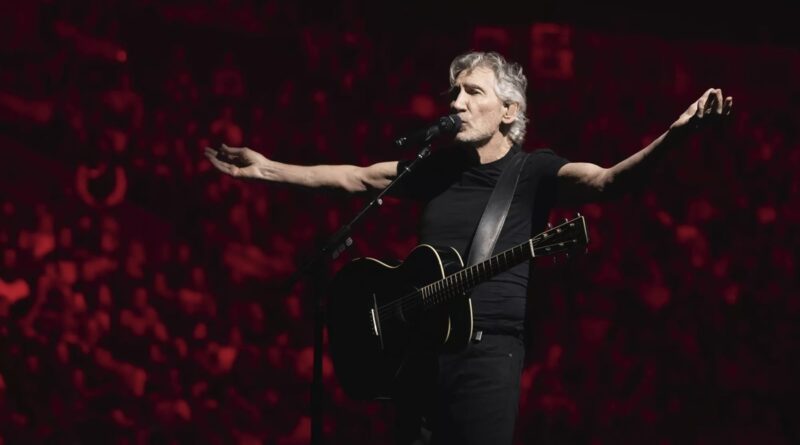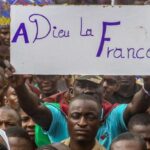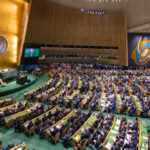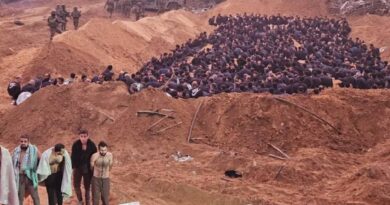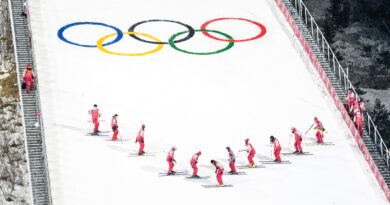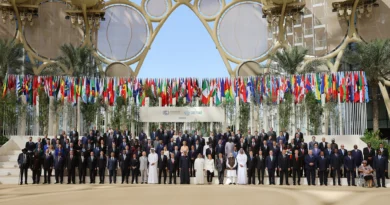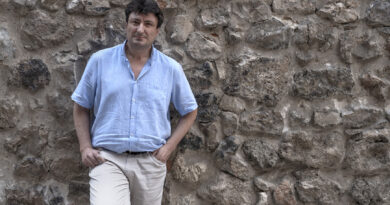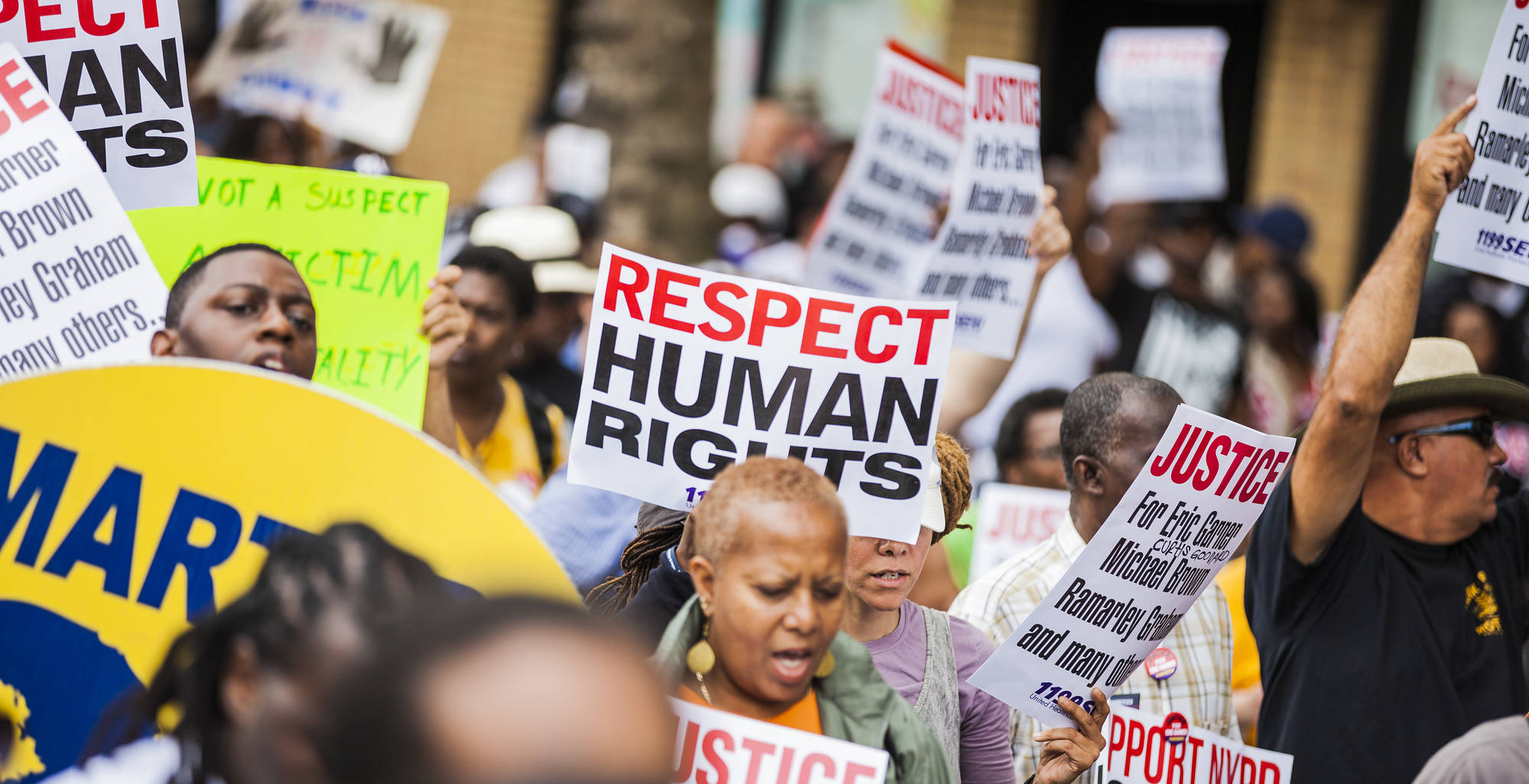Two nights in Santiago with Roger Waters
VIJAY PRASHAD
“Stop the Genocide” in white letters on a red background appears on the screens above the band's heads, as guitars tear through the night.
Nobody puts on a stadium show like Roger Waters. The music, of course, is resplendent, but so are the soundscape, the images, the giant sheep and pig, the lasers, the movies, the energy of the fans who - despite linguistic differences - chant... Did you change a supporting role in the war for a leading role in a cage?” It's an explosion of emotions. Santiago's quiet calm is broken by familiar sounds and necessary feelings: yes, we are here; yes, we exist; yes, we must resist.
Santiago is a city blistered by social inequality. For two nights, Roger Waters played at the Estadio Monumental in Macul, a commune in Santiago that is more middle class than the rest of the city, although still not immune to the sharp divisions produced by the massive social unrest of 2019. Then Roger He sang a version of The Right to Live in Peace, by Víctor Jara, with new lyrics for the new moment:
I hear the Cacerolazo
I smell you, Piñera
All fucking rats smell the same.
The Cacerolazo is the banging of pots, a social protest that resonated from Buenos Aires (2001) to Santiago (2011 and then again from 2019 to 2022). There is a good reason to go out into the streets and bang pots and pans every day given the permanent condition of austerity reproduced by people like the former president of Chile Sebastión Piñera, one more of the “shit rats” who make life hell.
There is austerity, the disappearance of social welfare and decent work, and the increase in poverty and social hopelessness. Then there are the heightened contradictions, the rage that sometimes gives rise to hope in madmen (the incoming president of Argentina, Javier Milei, is one of them) and at other times gives rise to disorganized and organized forms of dissidence.
A sheep flies over the tens of thousands of people present in the stadium. It is the physical correlate of the song that flies off the stage, a song to the atomization of people in society due to this State of Permanent Austerity and to the need for resistance.
Through quiet reflection, and great dedication
Master the art of karate
We will get up
And then we'll make the bastard's eyes water.
Why not? Why not get up? Of course, he runs like hell, fleeing as fast as you can from the forces of repression that want to manage the contradictions of austerity. But then—like Roger does, when the sound of the hammer hitting your door subsides—take off the T-shirt that says “run like hell” and put on one that says “hang in there.”
The guitars tear through the night, the lasers flash infinitely, and the desire to shake off the fear of the State of Permanent Austerity and launch into protest increases. But the images are chosen carefully. This is not a call to action without a strategy. “Master the art of karate,” Roger sings. Like the karateka, it takes dedicated study, and the battlefield must certainly be approached with care to “make the bastard's eyes water” and do so with careful strategy.
The sound of the hammer is both that of the police marching - in Chile the hated carabineros - and the banging of the people's tools, including the pots and pans. The stadium is engulfed by electric guitar madness (especially when Dave Kilminster has his eyes closed and his fingers on fire), symphonic beats that draw people to Roger's bar, a bottle of mezcal on the piano, Roger with arms raised, the night sky clear and hopeful because dawn is not far away.
Universal Human Rights
About 5 kilometers from the Monumental Stadium is the National Stadium, where Víctor Jara was assassinated by the coup regime of Augusto Pinochet 50 years ago. A few days before Roger's show in Santiago, Víctor's wife, Joan Jara, died, but his daughter Amanda was there to hear Roger acknowledge the murder of Víctor Jara and Inti-Illimani open the show with a tribute to Víctor, including a version sung at the top of your lungs The right to live in peace, in turn a tribute to Ho Chi Minh and the Vietnamese fighters.
Where they burst the flower
With genocide and napalm
Jorge Coulón, from Inti-Illimani, sang those verses with a kufiyah around his neck. Roger, with his acoustic guitar and kufiyah, and with the haunting voice of Shanay Johnson at his side, sings: “Leave Jerusalem, leave your burden.”
If I had been God
I wouldn't have chosen anyone
I would have put a heavy hand
To all my children
They would have been happy
To renounce Ramadan and Lent
Time best spent
In the company of friends
Breaking bread and mending nets.
“Stop the Genocide,” in white letters on a red background, appears on the screens above the band’s heads.
Roger was born in England in 1943 to a communist mother, Mary Duncan Whyte (1913-2009). His father, Second Lieutenant Eric Fletcher Waters, also a communist, was murdered in Italy in 1944 (immortalized in my favorite song, The Gunner's Dream, from Final Cut, 1983). Five years later, the United Nations drafted the Universal Declaration of Human Rights. That text is the basis of Roger's beliefs (“I don't know when I first read it,” Roger tells me after the show, but he references it often, even in his shows). Fierce advocacy of human rights governs Roger, his anti-war sentiment shaped by the loss of his father. It is this universal faith that drives Roger's political activity.
“Are there paranoids in the stadium?” asks Roger. We are paranoid not because we are clinically ill, but because there is a huge chasm between what we know to be true and what the powers that be tell us is supposed to be true. Roger Waters defends human rights, including the rights of Palestinians. We know that to be true because it is what he says and he acts in accordance with that belief. But the powers that be say that what Roger says is not true and that he is, in fact, anti-Semitic.
A consequence of the powers that be is that they tried to cancel his concert in Frankfurt and, strangely, all the hotel owners in Argentina refused to allow him - but not his band - a room in their establishments (he had to stay at a friend's house In uruguay). When Katie Halper and I asked him about this attack, Roger responded:
My platform is simple: it is the application of the 1948 Universal Declaration of Human Rights for all our brothers and sisters in the world, including those between the Jordan River and the Mediterranean Sea. My support for universal human rights is universal. It is not anti-Semitism, which is hateful and racist and which, like all forms of racism, I condemn without reservation.”
Roger says this over and over again, and yet time and again the powers that be smear Roger. “I won't be cancelled,” Roger said in Birmingham at a concert. And why would it be? The attempt to cancel critics of Israel had some impact in recent years, but it no longer carries weight: Israel's atrocities against the Palestinians of Gaza have produced new generations of people who see the atrocity of the Occupation and refuse to bow down. before the powers that be. “We need more than just a pause” in the bombing of Gaza, Roger said from the stage in Santiago, “a ceasefire that lasts forever,” the soundtrack to that sentiment produced by Seamus Blake's saxophone and lap steel. by Jon Carin.
The show begins with Pink - the protagonist of The Wall (1982) - in a wheelchair, comfortably numb. In the second half, Roger is in the wheelchair in a straitjacket, put there by orderlies of power. Is this the life we really want? Better not. See you on the dark side of the moon.
Roger Waters' “This is not a drill” tour of Latin America toured Brazil, Uruguay, Argentina, Chile, Peru, Costa Rica, Colombia and Ecuador, where it concluded in Quito on December 9.

